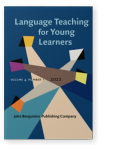Vol. 4:1 (2022) ► pp.143–170
“Very easy, it’s an English class, therefore they should not rely on a French text”
English language teachers’ beliefs regarding L1 use for literacy instruction
In the context of additional language (AL) learning, teachers need to focus on the development of language proficiency as well as on high-level literacy skills, for example, comprehending and evaluating information and creating new meaning. From a plurilingual perspective, AL learners’ first language (L1) is conceputalised as a useful tool in the development of target language proficiency; however, limited information exists concerning AL teachers’ beliefs towards the use of the L1 for high-level literacy instruction despite its potential utility for complex skill development. The aim of the present exploratory study was to examine the beliefs of in-service teachers of English as an additional language (EAL) working in the Quebec primary and secondary school system in francophone Canada regarding plurilingual approaches for classroom literacy practices and to uncover the factors that influence their beliefs. An online survey was distributed to in-service EAL teachers (N = 57) working in the province of Quebec, Canada. Findings suggest that teachers believe that it is most beneficial to adopt a monolingual lens to literacy instruction, a belief that denies learners’ use of their L1 and this, in a bilingual country. Implications for teacher education programs that challenge a monolingual lens are explored.
Article outline
- 1.Introduction
- 1.1Plurilingualism and translanguaging in language and literacy education
- 1.2Teachers’ beliefs and plurilingual approaches
- 1.3Current study
- 2.Methodology
- 2.1Linguistic context
- 2.2Participants
- 2.3Survey
- 2.4Data analysis
- 3.Results
- 3.1Permissible L1 use
- 3.2Requirements and constraints
- 3.2.1Teaching and evaluation goals of the program
- 3.2.2Constraints imposed by limited amount of time and geographical context
- 3.2.3Pressure from parents, the school, hearsay
- 3.2.4It’s English
- 3.3What matters for language learning
- 3.3.1Stated beliefs about how languages are learned
- 3.3.2Learner characteristics that are important to learning
- 3.4Language learning and teaching strategies
- 3.5Supporting literacy instruction through French
- 4.Discussion
- 4.1Pedagogical recommendations
- 5.Conclusion and future directions
- Notes
-
References
